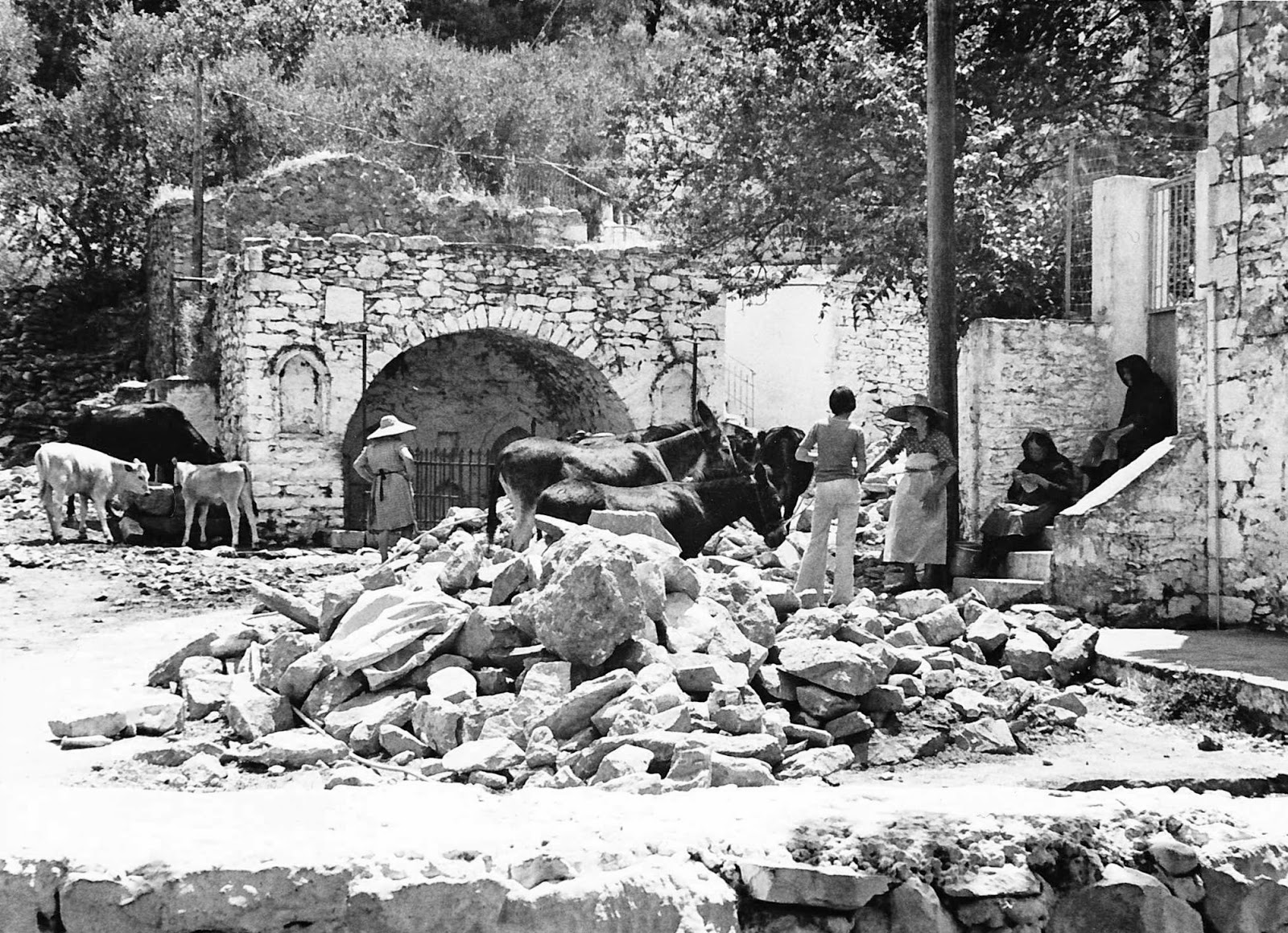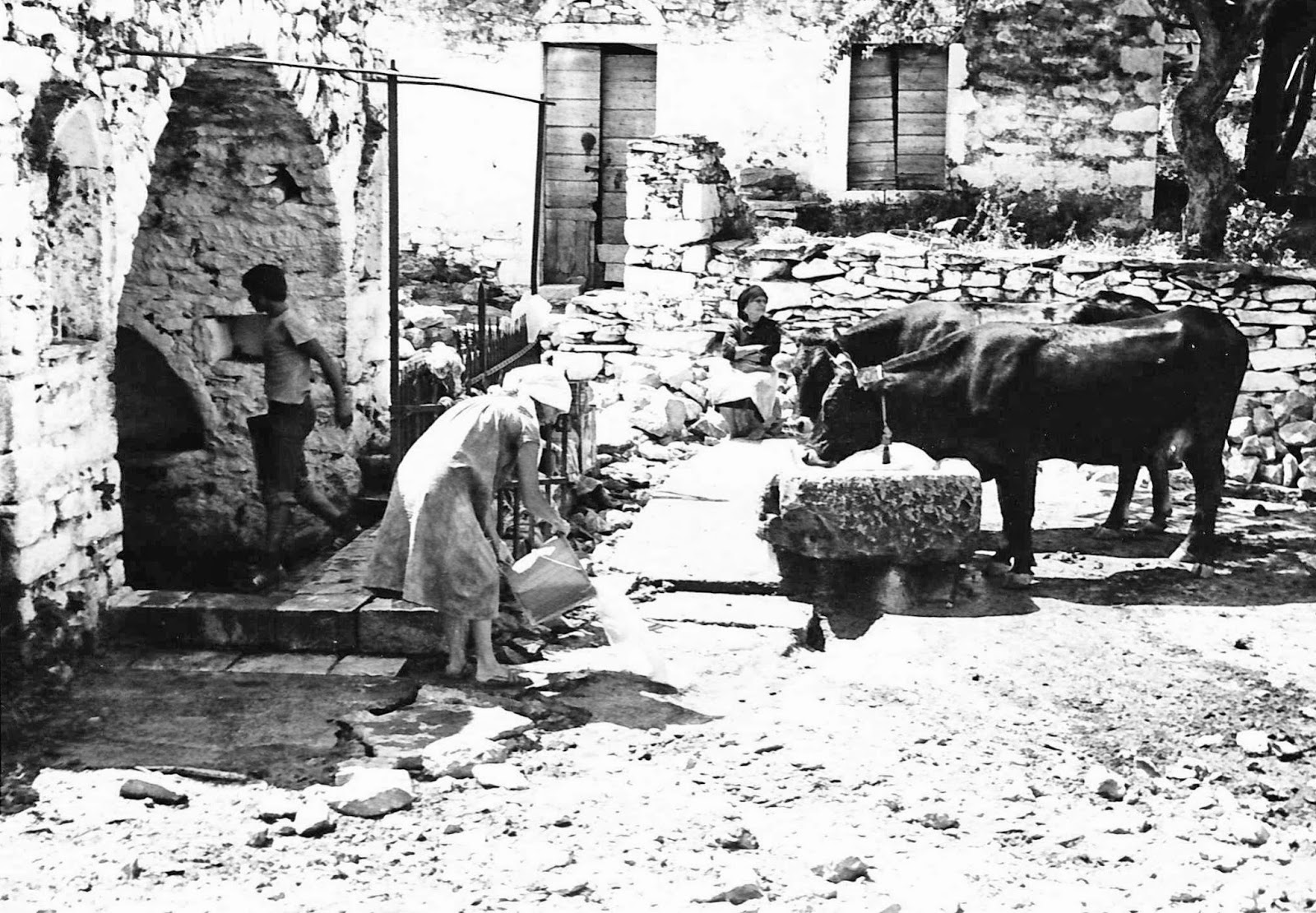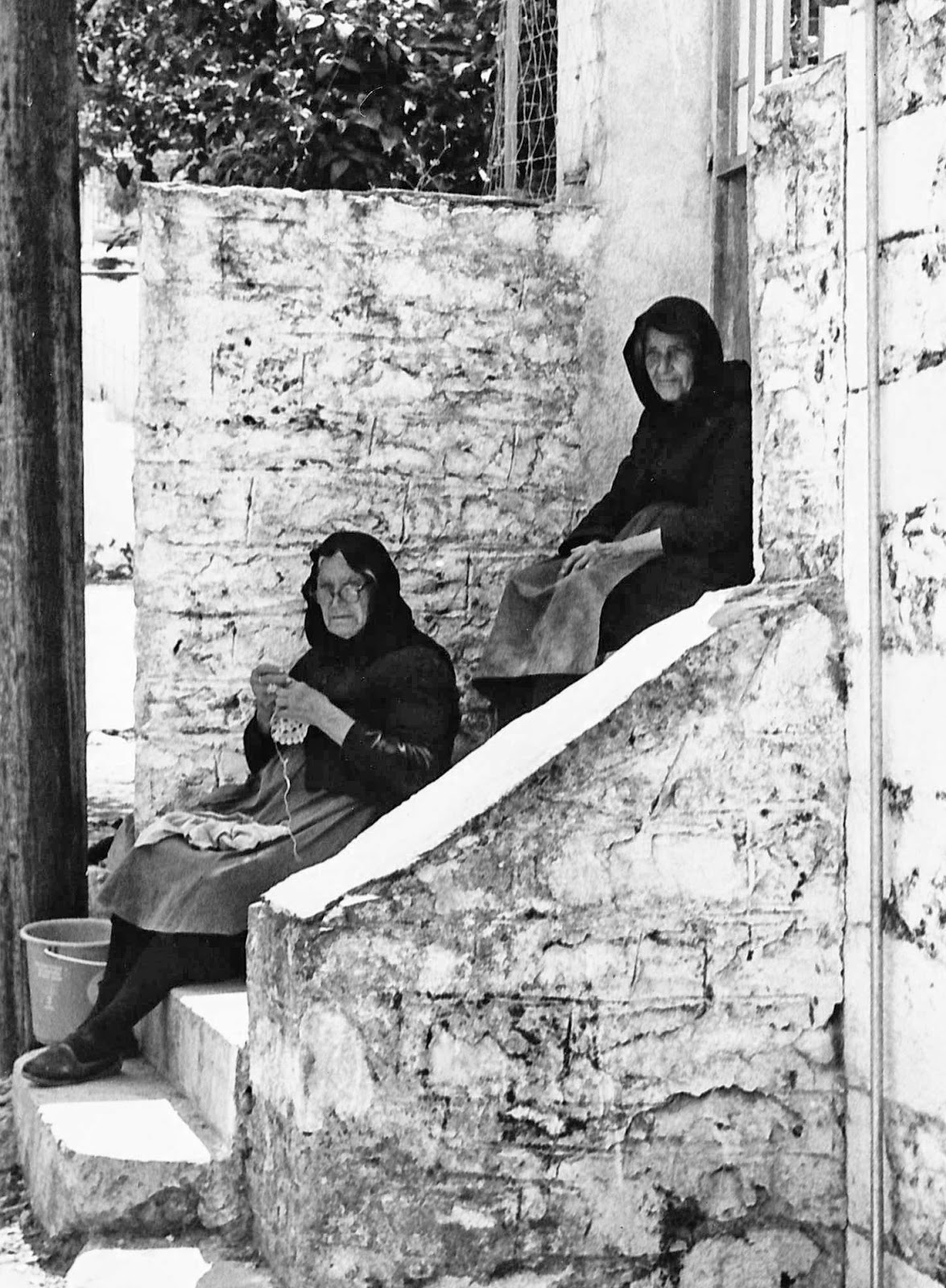Mani, Greece in the 1970s
We've been visiting Mani in the Peloponnese for
many years, first of all because we knew an Anglo Greek couple who had homes in
Athens and the Mani. It was lovely to be able to borrow their Mani house and
spend a few weeks living in the community amongst local people. Of course we
were tourists, but the area was not developed for tourism and there were
virtually no Brits there. The few tourists there were would tend to be Germans
in their shiny camper vans and some had started to buy houses in the villages.
The local people were genuinely kind and generous, both with their knowledge
and their hospitality, and over the years we learnt much about the Greek way of
life.
 |
| The communal well was where everyone congregated, things were discussed, water drawn, and clothes washed before water was piped into the village |
 |
| Joan washing clothes at the well with the cows looking on |
Kalamata, famous for its plump black olives, sits at the top of the peninsula, and has a fabulous market, where you can find almost all things edible, much of which is home grown.
 |
| Sheelagh rinsing a water bucket before lugging it back up the hill to the spiti (Greek home) |
I particularly used to love going to the market,
getting up early to catch the bus for the 1.5 hour journey. On arrival, a quick
and super sweet kafe metrio (supposed to be medium sweet
coffee - may explain the preponderance of gold teeth!) would set us up for a
couple of hours haggling in the market, buying our vegetables, feta, olives,
oil, honey, soap and anything else we needed.
 |
| Woman using wooden beaters to bang out the dirt from her rag rugs in the wash |
At lunchtime when the market closed, we'd have a
large lunch of gigantes, melanzane, patates and Greek salad in one of the
little streets crisscrossing the market. Then a wander around, usually buying a
basket and several bunches of oregani both to flavour our food and to bring
back home, finishing with kafe in the cafenion, watching the men playing tavli
(backgammon) before getting the bus back.
We were there several times before the 1986
earthquake, which sadly flattened the area of the agora, and the market was
subsequently rebuilt on a different site. Still a good market, but there was
something about the atmosphere of the old one, that the new version seems to
lack. Maybe I'm just being sentimental, but all life was there!
I was always fascinated by the textiles. The
local women wore headscarves made from a thin muslin, sometimes printed with
tiny patterns, sometimes plain. Every village home was furnished with glorious
rag rugs, beautiful vintage weavings, passed down through the generations, each
carrying its own history, made from old family clothes and homewares. Many of
these bore subtle, yet vibrant colourways and were woven with thin rags - quite
a different animal to those on sale in Mani now.
 |
| Lovely woman with olive oil can used for collecting water |
The village homes were very simple, but
scrupulously clean. On walks up the mountain, we would often be invited in and
given retsina, ouzo and mezes in the garden, which would be immaculate. On one
occasion we were accosted by an old goatherd who insisted I should milk his
goats. I tried to resist, but he was adamant, so I knelt down and proceeded to
fill the tin can he gave me. This was the last thing he'd been expecting, as I
assume the previous tourists he'd encountered couldn't turn their hands to milking
goats. Well on this occasion he'd met one who had thirteen goats at home so I
was completely au fait with how to do it. However, I hadn't counted on having to drink the warm
unstrained milk from the tin can and only managed a couple of sips before P
rescued me and obligingly drank the lot! Touché!
 |
| This man appeared from nowhere and insisted P take a photo of the two of them holding hands - very sweet! |
Finally I'd like to show you the local tatters. I
know they're using crochet hooks, and tatting uses a small shuttle, but there's
something called cro-tatting nd even needle tatting) which is a sort of
combination.
 |
| I specially love that her yarn seems to be recycled directly from an old sweater |
I've only ever seen one woman actually knitting
in Greece, but you see many sitting in their doorways chatting and tatting. The
lace curtains and bedspreads they make can be exquisite.
So the reason I'm telling you all this is that
we're off to Mani for a short holiday soon and we're taking a bunch of P's
40+-year-old photos to leave in the village where they were taken. Sadly we're
not staying there as we now have several British friends who have homes in the
area, closer to Kalamata, but we shall visit and leave the photos at the
cafenion. If we're lucky, one of the people in the photos might still be
around, but if they're no longer with us, then hopefully their families will
enjoy them.
Can't wait to get back there, the only blot on
the landscape is the noseeums, or little midges that make a beeline for me as
soon as I get off the plane. So I'm currently assembling a non-Deet repellant kit
consisting of B vitamin patches and bracelets, citronella based repellants, Zap
it stun gun to take the itch and swelling away if I do get bitten and Avon's
body lotion which smells like cheap disinfectant but is said to do the
business. Someone else told me that coconut oil is very good too, so today I've
added that to my pharmacopoeia. All this may sound slightly OTT but I
can't tell you the misery I was in with more than a hundred bites on each foot
(yes I counted them!) last time I was there. Forewarned is forearmed as my mum
used to say, and that I certainly will be this time. Any tales of your own
successful vanquishing of the mighty mozzies will be gratefully received.
Yassou!







Thanks for your message Jen, I suspected this post might be up your street. Don't know what's happening with the posting of the comments with Blogger, as I received an email notification, but no message appears on the blog. Ah well, ours is not to reason why... xox
ReplyDeleteThank you for posting these lovely pictures Jean and to P for taking them. They illustrate the social history as well as capture a wonderful atmosphere and are lovely things to share. X
ReplyDelete